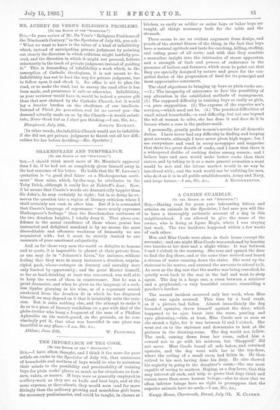THE IMPORTANCE OF THE COOK.
[To THE EDITOR OF THE " SPECTATOR."] SIR, —I have often thought, and I think it the more for your article on cooks in the Spectator of July 8th, that mistresses of households and mothers of boys would be wise to accustom their minds to the possibility and practicability of training boys for plain cooks' places as much as for situations as foot- men, valets, or nurses. If boys were as generally employed in scullery-work as they are as knife and boot boys, and at the same expense, or thereabouts, they would soon (and far more fittingly than the ordinary growing and musoleless girl) learn the necessary preliminaries, and could be taught, in classes or kitchen, as easily as soldier or sailor boys or baker boys are taught, all things necessary both for the table and the stomach.
There seems to me an evident argument from design, and proofs of the eternal fitness of the thing, in the fact that boys have a natural aptitude and taste for catching, killing, stuffing, and eating game of all sorts ; and with that they combine a masculine insight into the intricacies of steam apparatus, and a strength of limb and powers of endurance in the presence of boilers and furnaces, which seem to point out that they are specially designed by nature and grace for the con- genial duties of the preparation of food for its principal and most appreciative consumers.
The chief objections to bringing up boys as plain cooks are : —(1.) The incapacity of mistresses to face the possibility of any alteration in the established methods of management. (2.) The supposed difficulty in training boys as easily as girls, —a pure supposition. (3.) The expense of the superior sex's services,—which need not be, (4.) The practical difficulties of small mixed households,—a real difficulty, but not one beyond the wit of woman to solve, she has done it and does do it in houses where a man is the parlour-maid.
I, personally, greatly prefer women's service for all domestic duties. I have never had any difficulty in finding and keeping good servants, although I have never given high wages ; but I see everywhere and read in every newspaper and magazine that there is a great dearth of cooks, and I know that there is a widespread dislike of cooking duties among women ; and I believe boys and men would make better cooks than their sisters, and by taking to it as a more general avocation a want would be met and the labour market would in no way be interfered with; and the work would not be unfitting for men, who do it as it is in all public establishments, Army and Navy, and large houses.—I am, Sir, &c., A HOUSEKEEPER.


































 Previous page
Previous page